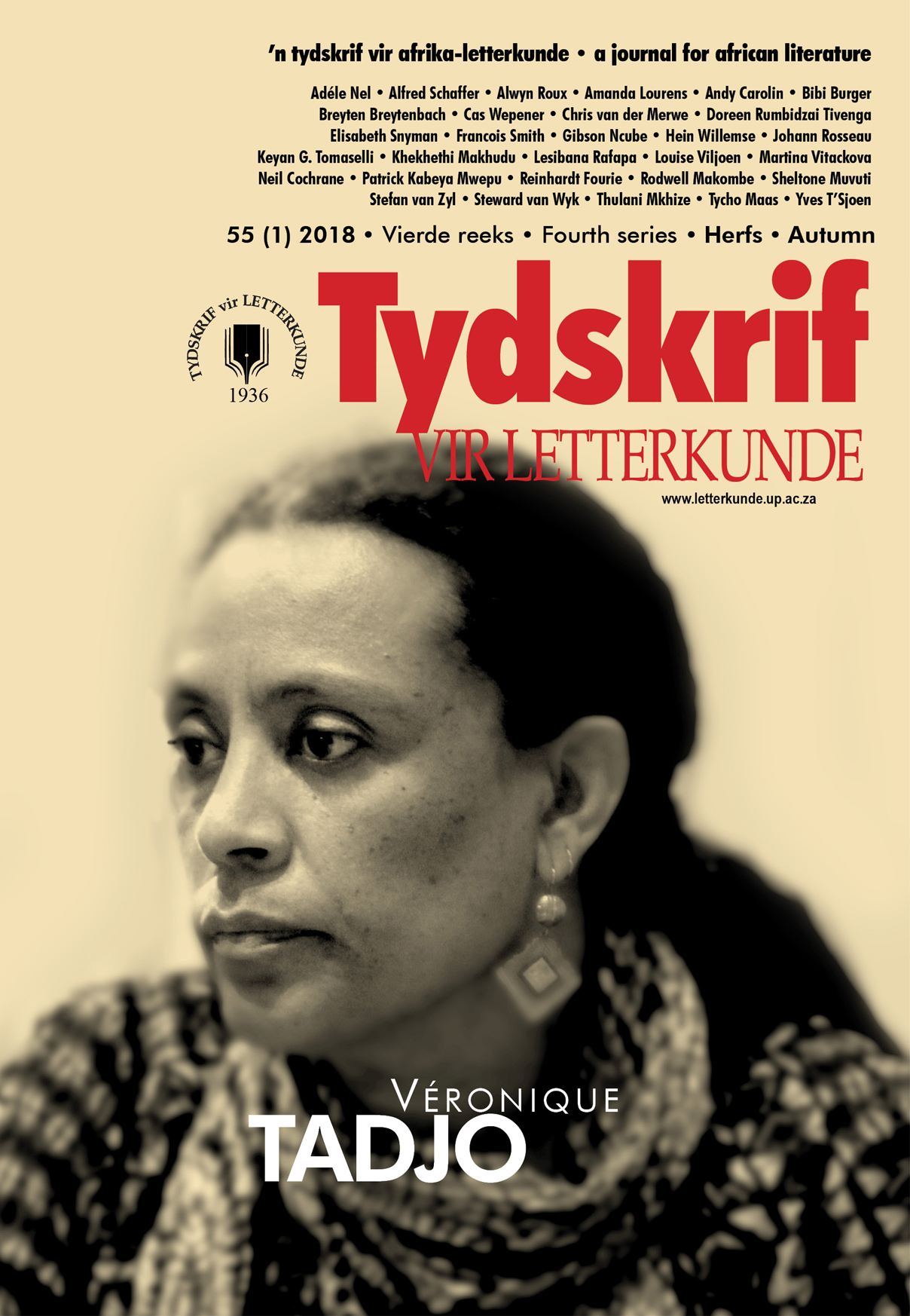Contemporary Zimbabwean popular music in the context of adversities
DOI:
https://doi.org/10.17159/2309-9070/tvl.v.55i1.1583Keywords:
ghetto youth, resistance, Winky D, Zimbabwe urban grooves music, popular musicAbstract
Contemporary Zimbabwean popular and urban genres of music namely, urban grooves and its variant Zimdancehall emerged and continue to exist at a time Zimbabwe is grappling with socio-economic and political adversities. The music is part of crucial artistic forms and dissent, hence for the ordinary Zimbabweans, it plays a significant role, detailing their experiences and survival strategies and influencing their patterns of entertainment and daily cultural practises. This article which is informed by popular culture theorists such as Karin Barber (1987) and John Fiske (1989) makes a textual analysis of Winky D's (2015) songs "Disappear", "Copyrights" and "Survivor" to examine the power of the songs in exploring the survival strategies employed by ordinary Zimbabweans in dealing with their experiences. The paper examines how the music is a source of power that fosters a response resonating with a postcolonial urban youth cultural activism seeking to empower the ordinary Zimbabweans to autonomously transcend their adversities and take control of their destinies in a country where the ruling elite are failing to improve the nation's socio-economic conditions.
Downloads
References
Barber, Karin. “Popular Arts in Africa.” African Studies, vol 30, no 3, 1987, pp. 1–78.
Bere, Wonderful. G. Urban Grooves: The Performance of Politics in Zimbabwe’s Hip Hop Music. New York U, 2008.
Chagonda, Tapiwa. “Dollarization of the Zimbabwean economy: cure or curse? The case of teaching and banking sectors.” The Renaissance of African Economies: CODESRIA Conference. 2010.
Chari, Tendai. “Continuity and Change: Impact of Global Popular Culture on Urban Grooves Music in Zimbabwe.” 2009. Muziki: Journal of Music Research in Africa, vol 6, no 2, 2009, pp. 170–91.
Chikowero, Mhoze. Struggles Over Culture: Zimbabwean Music and Power — 1930s—2007. 2008. Dalhousie U, PhD thesis.
Correspondent. “Alert on the abduction of Kudakwashe Kambakunje.” The Zimbabwean. 28 Sep. 2016. http://www.thezimbabwean.co/2016/09/alert-on-the-abduction-of-kudakwashe-kambakunje/.
De Block, Liesbeth and Buckingham, David. Global Children, Global Media: Migration, Media and Childhood. Palgrave Macmillan, 2007.
Entertainment writer. “Winky D’s Disappear Tops BBC Charts.” The Daily News. 2 Feb. 2016. https://www.dailynews.co.zw/articles/2016/02/02/winky-d-s-disappear-tops-bbc-charts.
Felex Share Harare Bureau. “6, 000 employees dismissed, unions appeal to President.” Chronicle. 25 Jul. 2015. http://www.chronicle.co.zw/6000-employees-dismissed-unions-appeal-to-president/.
Fiske, John. Reading Popular Culture. Routledge, 1989.
Grundy, Trevor. “Chenjerai Hove: a voice for the voiceless in Mugabe’s Zimbabwe.” Politics Web. 21 July. 2015. http:www.politicsweb.co.za/news-and-analysis/chenjerai-hove-a-voice-for-the-voiceless-in-mugabe/.
Human Rights Watch. “Zimbabwe: violent crackdown on street vendors.” Human Rights Watch. 29 Jul 2015. https://www.hrw.org/news/2015/07/29/zimbabwe-violent-crackdown-street-vendors.
Kellerer, Katja. “Chant down the system till Babylon falls: the political dimension of the underground hip hop and urban grooves in Zimbabwe.” The Journal of Pan African Studies, vol 6, no 3, 2013, pp. 43–64.
Kunambura, Andrew. “Vendors remain defiant.” The Financial Gazette. 24 Jun. 2015. http://www.financialgazette.co.zw/vendors-remain-defiant/.
Lipsitz, George. Dangerous Crossroads: Popular Music, Post-Modernism and the Poetics of Place. Verso, 1994.
Manase, Irikidzayi. “The aesthetics of Winky D’s Zimbabwe urban grooves music and an overview of his social commentary on the post-2000 experiences in Harare and other urban centers.” Muziki: Journal of Music Research in Africa, vol 8, no 2, 2012, pp. 81–95.
Manase, Irikidzayi. “Zimbabwean urban grooves and their subversive performance practices.” Social Dynamics: A Journal of African Studies, vol 35, no 1, 2009, pp. 56–67.
Mate, Rekopantswe. “Youth lyrics, street language and the politics of age: contextualisingthe youth question in the third
Chimurenga in Zimbabwe.” 2012. Journal of Southern African Studies. 38:1. p.107-27.
Mbembe, Achille. On the Postcolony. U of California P, 2001. M1. Interview. Harare, 2016.
Moyo, Jeffrey. “Informal Carpentry Hammers away Zimbabwe’s State Revenue.” ipsnews.net. 21 Apr. 2014. http://www.ipsnews.net/2014/04/informal-carpenters-hammer-away-zimbabwes-state-revenue/.
Mtonzi, Bronwise. “Winky D outshines I-Octane.” The Herald. 14 Dec. 2015. http://www.herald.co.zw/winky-d-outshines-i-octane/.
Mugari, Victor. “Code switching in Zimbabwe urban grooves music.” Language Matters, vol 45, 2014, pp. 24–236.
Mugugunyeki, Moses. “I’m not a Satanist: Winky D.” The Standard. 17 Jan. 2016. https://www.thestandard.co.zw/2016/01/17/im-not-a-satanist-winky-d/.
Ndlela, Nkosi. “Alternative media and the global popular: youth and popular culture in Zimbabwe.” Glocal Times, vol 5, 2006, pp. 1–15.
Ndlovu, Bongani. “Winky D’s Disappear 2016 catch phrase.” Chronicle. 3 Jan. 2016. http://www.chronicle.co.zw/winky-ds-disappear-2016-catch-phrase/.
Showbiz Reporter. “The truth about Winky D.” New Zimbabwe. 25 Mar. 2011. http://www.newzimbabwe.com/showbiz-4758-The+Truth+About+Winky+D/showbiz.aspx.
Staff reporter. “Unpacking ZANU-PF’s manifesto.” The Financial Gazette. 11 Jul 2013. http://www.financialgazette.co.zw/unpacking-zanu-pfs-manifesto/.
Olson, P. J. and B. J. R. Shobe, “White rappers and black epistemology.” Journal of Popular Culture, vol 41, no 6, 2008, pp. 994–1011. P1. Interview. Harare, 2016.
Paveda, David. “Language and talk.” Contemporary Youth Culture: An International Encyclopedia, edited by Shirley
Steinberg, Priya Parmar and Birgit Richard, Greenwood Press, 2006. https://search.credoreference.com/content/entry/gwy outh/language_and_talk/0.
Pongweni, Alec. J. C. Songs that Won the Liberation War. College Press, 1982.
Potter, Russel. A. Spectacular Vernaculars: Hip-Hop and the Politics of Postmodernism. U of New York P, 1995.
Thanatos. “Abracadabra.” Urban Dictionary. 2 Feb. 2005. https://www.urbandictionary.com/define.php?term=Abracadabra.
Veit-Wild, Flora. Teachers, Preachers, Non-Believers. Baobab Books, 1993.
Veit-Wild, Flora. “Zimbolicious’ –The creative potential of linguistic innovation: the case of Shona-English in Zimbabwe.” Journal of Southern African Studies, vol 35, no 3, 2009, pp. 683–97.
Viriri, Advice, Agnella, Viriri, and Carter Chapwanya. “The influence of popular music, in particular urban grooves on the Zimbabwean youth: the case of the troika, Maskiri, Winky D and Extra Large. 2011.
Muziki: Journal of Music Research in Africa, vol 8, no 1, 2011, pp. 82–95.
Wenzel, Jennifer. “Amandla! awethu!” International Journal of Post-Colonial Studies, vol 18, no 6, 2016, pp. 816–22.
Willems, Wendy. “Risky dialogue: The perfomative state and nature of power in a postcolony.” Journal of African Cultural Studies, vol 27, no 3, 2015, pp. 356–69.
“Winky D.” www.pindula.co.zw. 30 Nov 2016. http://www.pindula.co.zw/Winky_D.
Downloads
Published
Issue
Section
License
Copyright (c) 2018 Tydskrif vir Letterkunde

This work is licensed under a Creative Commons Attribution-ShareAlike 4.0 International License.


 https://orcid.org/0000-0001-6465-6584
https://orcid.org/0000-0001-6465-6584


.png)